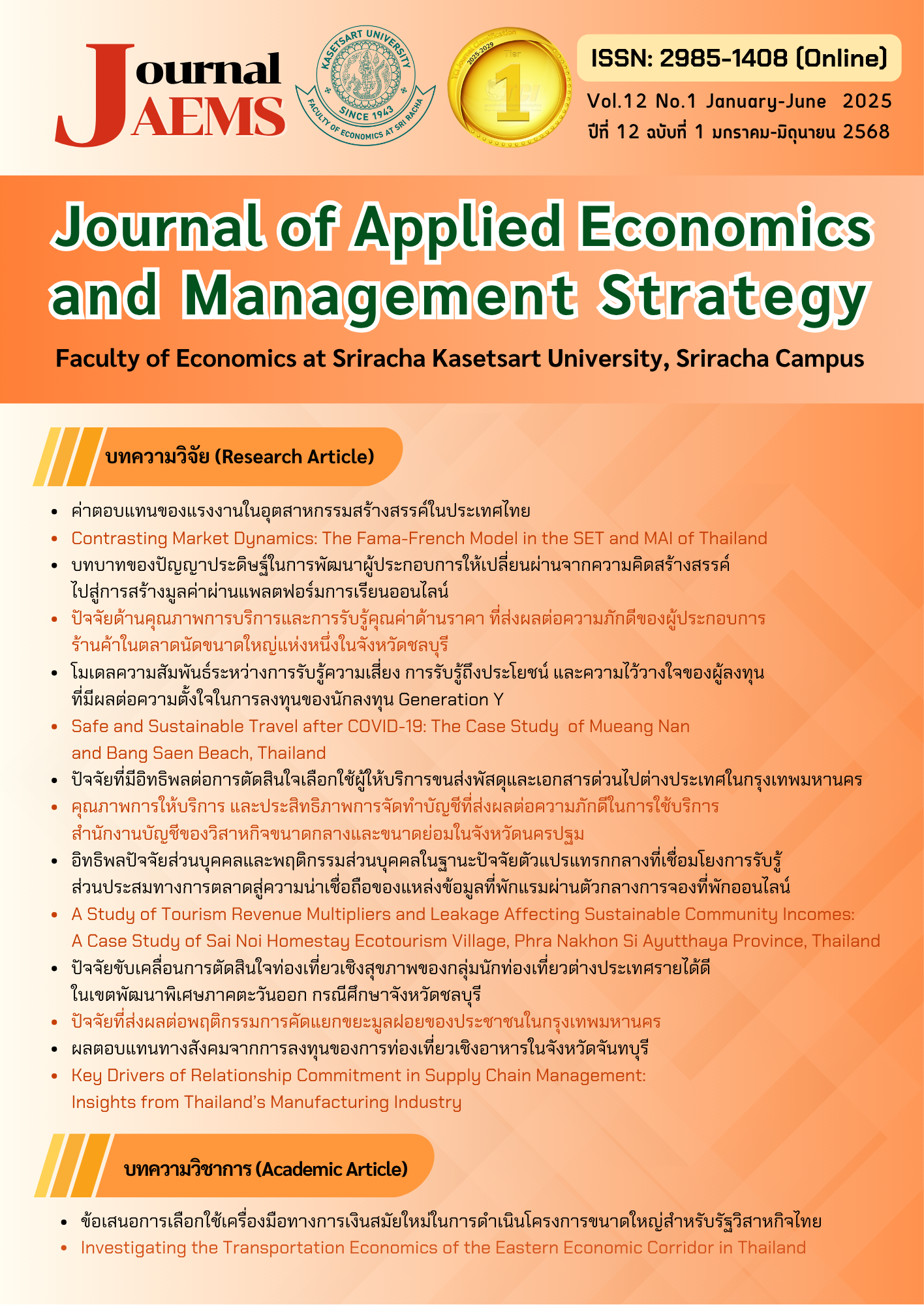Factors Influencing Solid Waste Segregation Behavior of People in Bangkok
Main Article Content
Abstract
This research aims to study the factors influencing solid waste segregation behavior among residents living in Bangkok. The study collected data through an online questionnaire from a sample group of 421 individuals aged 15 and above, residing in Bangkok, during May–June 2024. The research applied the Theory of Planned Behavior (TPB) and used descriptive statistics, which include mean, percentage, and tables, along with quantitative statistics by using structural equation model in the form of path analysis. Most respondents were female, aged 34 years in the average, holding Bachelor degree, working as employee of the private company to earn average personal income of 29,482 baht per month and have average current spending of 17,530 baht per month. The average number of earning family members was 3. They had great knowledge of waste sorting and viewed that household waste has caused the environmental problems. They had intention to perform solid waste segregation. The findings revealed that the factors influencing solid waste segregation behavior among the sample group include: 1) Direct factors: Residence area, age, gender, prior participation in environmental activities, level of intention, attitude towards the behavior, conformity to reference groups, perceived behavioral control, and denial of responsibility for waste segregation; 2) Indirect factors: Economic motivation, moral norms, knowledge of waste types and the environment, indirect attitude, indirect conformity to reference groups, and education level; and 3) Factors with both direct and indirect effects: Indirect perceived behavioral control. Therefore, policy makers should promote the sorting of all types of solid waste through various media channels or through individuals that the people trust, and should also eliminate the cost barriers related to waste sorting.
Downloads
Article Details

This work is licensed under a Creative Commons Attribution-NonCommercial-NoDerivatives 4.0 International License.
References
กรมการปกครอง. (2567). ระบบสถิติทางการทะเบียน. สืบค้นเมื่อ 5 กุมภาพันธ์ 2567 จาก https://stat.bora.dopa.go.th/stat/statnew/statyear/#/FilterPageAge.
กรมควบคุมมลพิษ. (2567). ข้อมูลสถานการณ์ขยะมูลฝอยของประเทศ. สืบค้นเมื่อ 5 กุมภาพันธ์ 2567 จาก https://thaimsw.pcd.go.th/report_country.php.
ไทยพับลิก้า. (2565). วาระซ่อมกรุงเทพฯ: แผนจัดการขยะมูลฝอย กทม. 20 ปี ยังคง “ล้นเมือง” ต่อไป. สืบค้นเมื่อ 5 กุมภาพันธ์ 2567 จาก https://Thaipublica.org.
สำนักงานสถิติแห่งชาติ. (2566). รายงานสถิติจำนวนประชากรแฝงในกรุงเทพมหานคร พ.ศ.2566. สืบค้นเมื่อ 5 กุมภาพันธ์ 2567 จาก https://www.nso.go.th/nsoweb/nso/survey_detail/yS
อภินัทธ์ นิลสุข ศรัณญา เบญจกุล และมณฑา เก่งการพานิช. (2565). ปัจจัยที่มีผลต่อพฤติกรรมการจัดการขยะมูลฝอยของครัวเรือนในอำเภอทับสะแก จังหวัดประจวบคีรีขันธ์. วารสารพฤติกรรมศาสตร์เพื่อการพัฒนา, 14(2), 19-38.
Ajzen, I. (1991). The theory of planned behavior. Organizational Behavior and Human Decision Processes, 50(2), 179-211. Doi: 10.1016/0749-5978(91)90020-T.
Ajzen, I. (2019). TPB questionnaire construction. Retrieved from https://people.umass.edu/aizen/pdf/tpb.measurement.pdf
Ajzen, I. (2020). The theory of planned behavior: Frequently asked questions. Human Behavior & Emerging Technologies, 2(4), 314-424.
Bei, L.T. & Simpson, E.M. (1995). The determinants of consumer purchase decision for recycled products: an application of acquisition-transaction utility theory. In: Kardes, F.R. & Sujau, M. Eds., Advances in consumer research 22, Association for Consumer Research, Provo, 257-261.
Fikadu, D, S., Sadore, A, F., Agafari, B, G., & Doyore, F. (2022). Intention to comply with solid waste management practices among households in Butajira town, Southern Ethiopia using the theory of planned behavior. PLOS ONE, 17(7), 1-15. https://doi.org/10.1371/journal.pone.0268674
Fishbein, M., & Ajzen, I. (1975). Belief, attitude, intention and behavior: An introduction to theory and research. Reading, MA: Addison-Wesley.
Huang, D.Z.G., Yin, X., & Gong, Q. (2015). Residents’ waste separation behaviors at the source: Using SEM with the theory of planned behavior in Guangzhou, China. International Journal of Environmental Research and Public Health, 12(8), 9475- 9491. https://doi.org/10.3390/ijerph120809475
Kreitler, S. (2018). The mind-body problem: The perspective of psychology. Open Journal of Philosophy, 8, 60-75. Retrieved from http://www.scrip.org/journal/ojpp.
Oyekale, A. (2018). Determinants of households’ involvement in waste separation and collection for recycling in South Africa. Environ Dev Sustain, 20, 2343-2371. https://doi-org.portal.lib.ku.ac.th/10.1007/s10668-017-9993-x.
Oztekin, C., Teksoz, G., Pamuk, S., Sahin, E., & Kilic, D.S. (2017). Gender perspective on the factors predicting recycling behavior: Implications from the theory of planned behavior. Waste Management, 62, 290-302.
Raghu, S. J. & Rodrigues, L. L. R. (2020). Behavior aspects of solid waste management: A systematic review. J. Air Waste Manag Assoc., 70(12), 1268-1302. Doi: 10.1080/10962247.2020.1823524 Epub 2020 Oct 29.
Shuangying, Y., Tiezhan, L., Xuepeng, Q., & Weisheng, Z. (2018). Behavioral intention analysis of waste separation in China - Case study of Hangzhou using theory of planned behavior. IRSPSD International, 6(3), 63-77. http://dx.doi.org/10.14246/irspsd.6.3_63
Wu, L., Zhu, Y., & Zhai, J. (2022). Understanding waste management behavior among university students in China: Environmental knowledge, personal norms, and the theory of planned behavior. Frontiers in psychology, 12(771723), 1-14. https://doi.org/10.3389/fpsyg.2021.771723
Yamane, T. (1970). Statistic: An introductory analysis. Tokyo: John Weatherhill, Inc.
Yuan, Y., Nomura, H., Takahashi, Y., & Yabe, M. (2016). Model of Chinese household kitchen waste separation behavior: A case study in Beijing City. Sustainability 2016, 8(10), 1-28. https://doi.org/10.3390/su8101083
Zaikova, A., Deviatkin, I., Havukainen, J., Horttanainen, M., Astrup, T., Saunila, M. & Happonen, A. (2022). Factors influencing household waste separation behavior: Cases of Russia and Finland. Recycling, 7(4), 1-28. https://doi.org/10.3390/recycling7040052.
Zhang, D., Yin, X., & Gong, Q. (2015). Residents’ waste separation behaviors at the source: Using SEM with the theory of planned behavior in Guangzhou, China. International Journal of Environmental Research and Public Health, 12(8), 9475-9491. https://doi.org/10.3390/ijerph120809475
